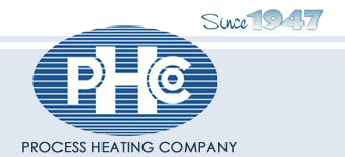Home > Manufacturers > Process Heating
Process Heating
It all began back in 1947 when Ed Jay and his partner Rudy Hentz continued and perfected their vision of producing a better heat source for industry.
The challenge was to apply advanced heating technology to produce a cleaner, safer and a more reliable source of heat that could be used to maintain temperature of a wide variety of products. Thus, Process Heating Company was formed to do just that.
At the time, Ed and Rudy developed the idea of a consistent electric based heat they referred to as "Lo-Density" resistance heat to be used by the asphalt industry primarily in tanks of liquid asphalt. It was essential that this temperature sensitive material be kept viscous for use at any time. The prevailing source of heat at the time was fossil fuel fired and steam heating units that were prone to maintenance problems, were unreliable, damaged materials being heated and were environmentally unsound.
Developing a series of patented parts, PHCo’s new method of heating overcame all of these objections to existing heaters. Lo-Density refers to the unique feature that keeps the heaters sheath temperature low. Low sheath temperature means long element life and the virtual elimination of damage to the products being heated.
Since that pioneering effort, PHCo and Ed Jay’s sons, Ron and Rick, have produced a large variety of systems now used to heat such products as asphalt, many petroleum derivatives, animal fats and oils, molasses, lignites, waxes, paints and a variety of chemicals such as those found in pulp and paper mills. Other recent applications include heating air for yarn manufacturing and the forms for concrete railroad ties.
Therefore, after over 60 years, Process Heating Company is now a true leader in a field that has come into its own. As you look over the terrific product line in this site, keep in mind what has gone into their production. "Lo-Density" electric heating is the wave of the future when it comes to heaters for the process heat industry.
Electric Heat Is Sustainable
Process Heating Company's Lo-Density? Unitized Storage Tank Heaters provide unique environmental benefits that can help asphalt producers, contractors and public works highway/street departments achieve sustainability goals – including NAPA's Diamond Achievement Commendation and its new Diamond Achievement Sustainable Commendation.
Electric heat is safe, consistent and friendly to the environment because it heats without combustion or emissions, and it eliminates a source of fuel spills, protecting groundwater supplies. Electric heat offers 100% energy efficiency because all of the energy is used to heat, when compared to the inefficient burning of fossil fuels. In addition, the efficiency will always be 100%, even after many years of operation, without costly maintenance. Electric heat also eliminates stacks that must be monitored for emissions, along with eliminating air quality and boiler permits that must be pursued and maintained. Unitized Heaters can be interfaced and coordinated with other plant electrical equipment so that the load of the heaters can be reduced to base rates, thus preventing increased demand charges or peak-use rates and lowering consumption cost.
The challenge was to apply advanced heating technology to produce a cleaner, safer and a more reliable source of heat that could be used to maintain temperature of a wide variety of products. Thus, Process Heating Company was formed to do just that.
At the time, Ed and Rudy developed the idea of a consistent electric based heat they referred to as "Lo-Density" resistance heat to be used by the asphalt industry primarily in tanks of liquid asphalt. It was essential that this temperature sensitive material be kept viscous for use at any time. The prevailing source of heat at the time was fossil fuel fired and steam heating units that were prone to maintenance problems, were unreliable, damaged materials being heated and were environmentally unsound.
Developing a series of patented parts, PHCo’s new method of heating overcame all of these objections to existing heaters. Lo-Density refers to the unique feature that keeps the heaters sheath temperature low. Low sheath temperature means long element life and the virtual elimination of damage to the products being heated.
Since that pioneering effort, PHCo and Ed Jay’s sons, Ron and Rick, have produced a large variety of systems now used to heat such products as asphalt, many petroleum derivatives, animal fats and oils, molasses, lignites, waxes, paints and a variety of chemicals such as those found in pulp and paper mills. Other recent applications include heating air for yarn manufacturing and the forms for concrete railroad ties.
Therefore, after over 60 years, Process Heating Company is now a true leader in a field that has come into its own. As you look over the terrific product line in this site, keep in mind what has gone into their production. "Lo-Density" electric heating is the wave of the future when it comes to heaters for the process heat industry.
Electric Heat Is Sustainable
Process Heating Company's Lo-Density? Unitized Storage Tank Heaters provide unique environmental benefits that can help asphalt producers, contractors and public works highway/street departments achieve sustainability goals – including NAPA's Diamond Achievement Commendation and its new Diamond Achievement Sustainable Commendation.
Electric heat is safe, consistent and friendly to the environment because it heats without combustion or emissions, and it eliminates a source of fuel spills, protecting groundwater supplies. Electric heat offers 100% energy efficiency because all of the energy is used to heat, when compared to the inefficient burning of fossil fuels. In addition, the efficiency will always be 100%, even after many years of operation, without costly maintenance. Electric heat also eliminates stacks that must be monitored for emissions, along with eliminating air quality and boiler permits that must be pursued and maintained. Unitized Heaters can be interfaced and coordinated with other plant electrical equipment so that the load of the heaters can be reduced to base rates, thus preventing increased demand charges or peak-use rates and lowering consumption cost.


 Product
Product